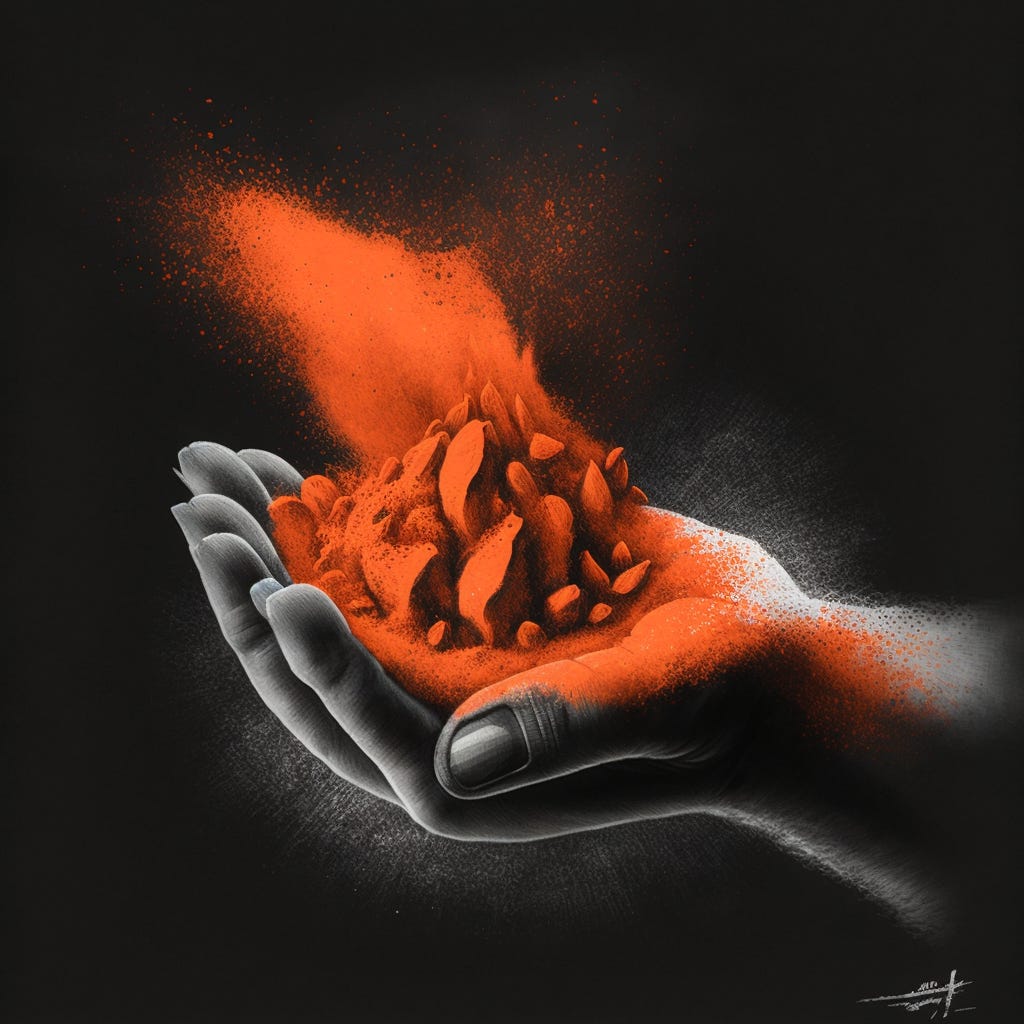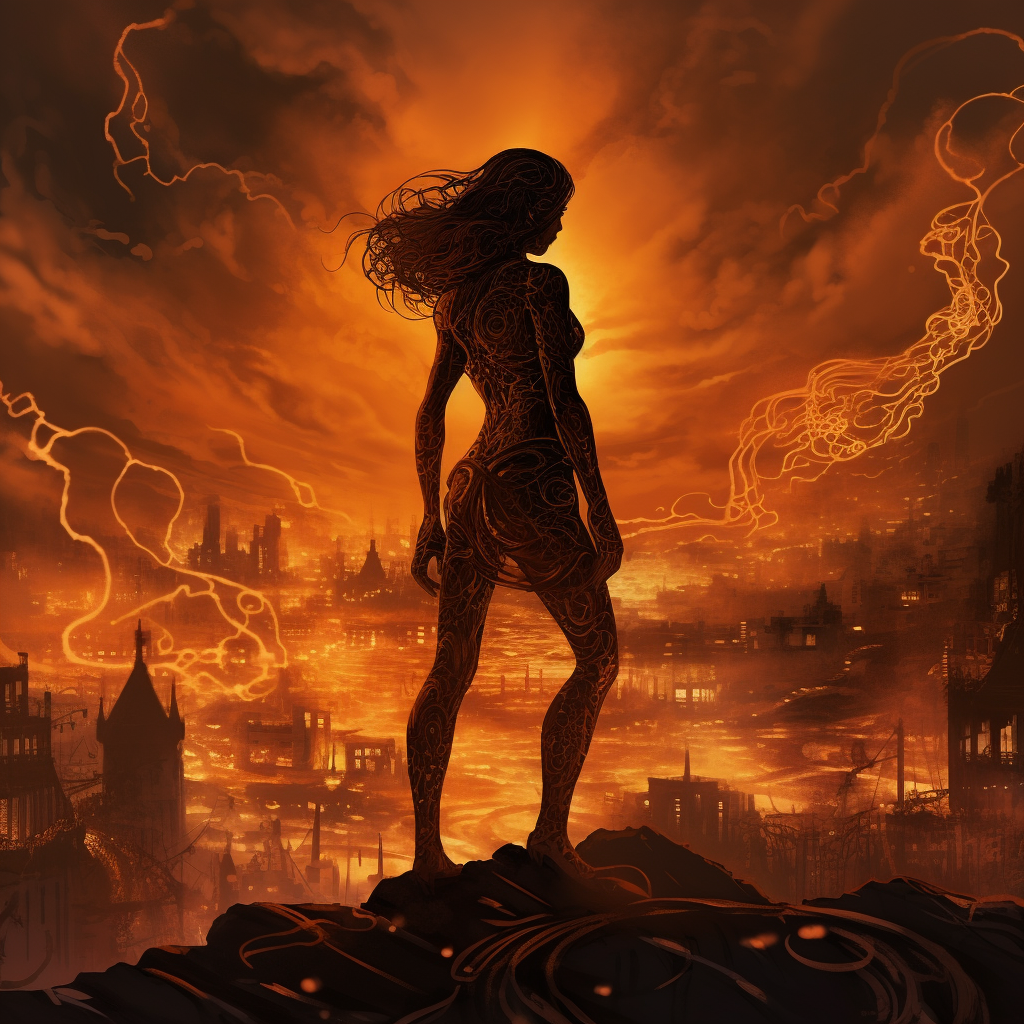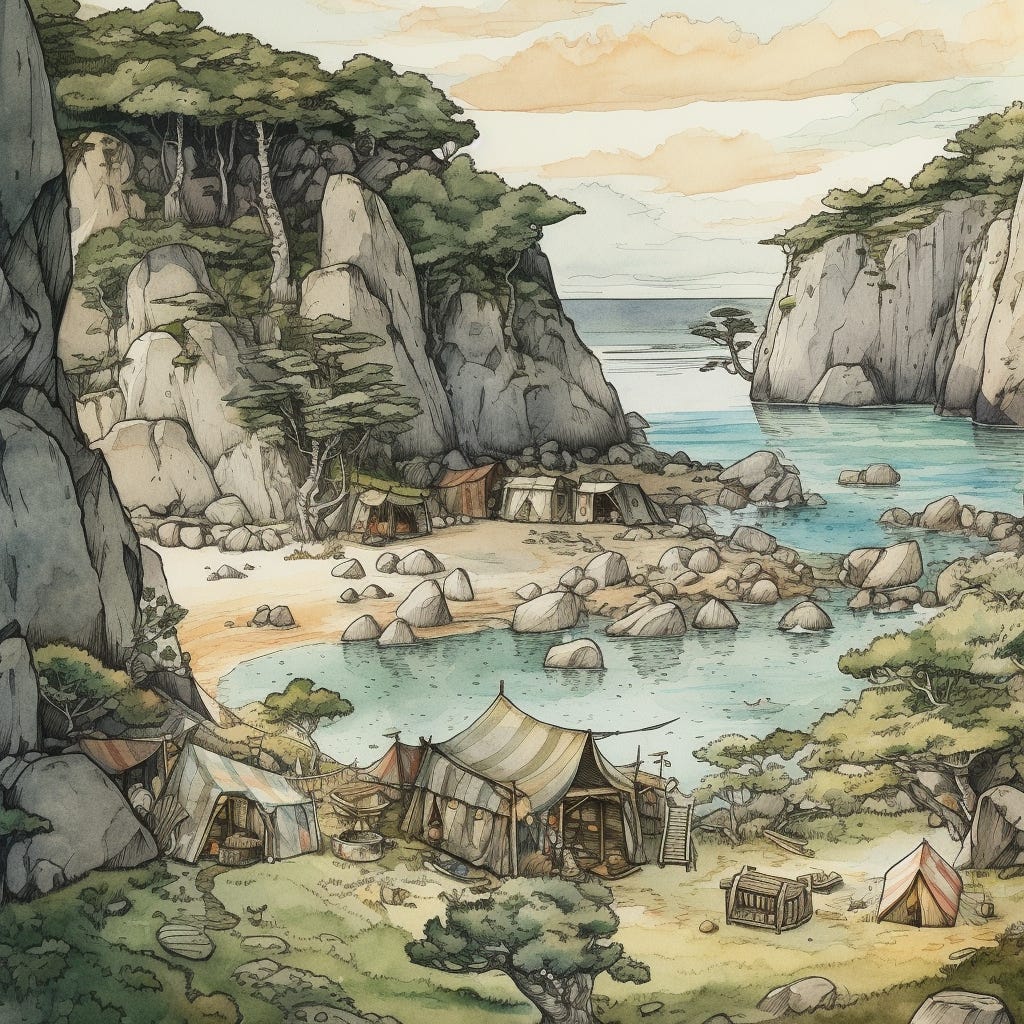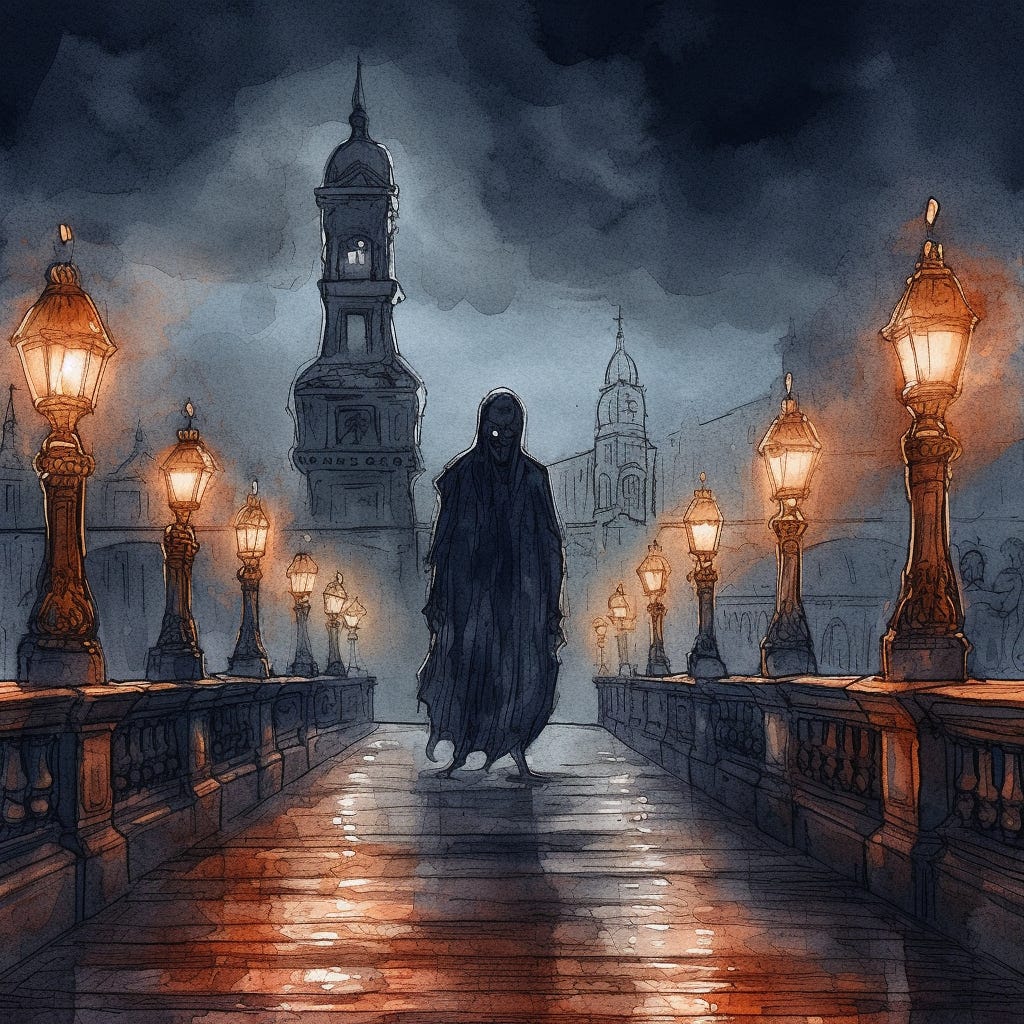Craftsman of Strife
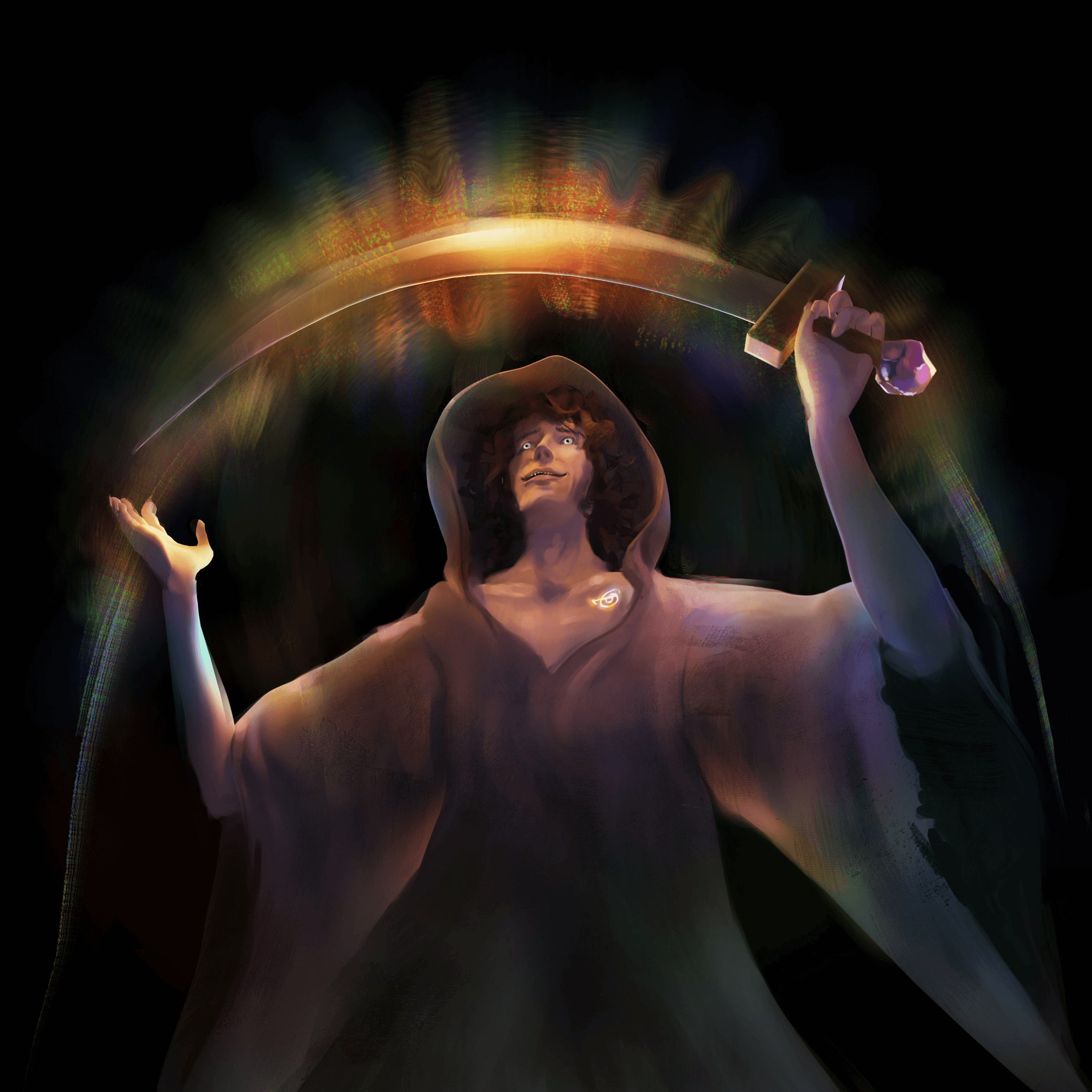
This ballad was shared at the 49th Conclave of Bards by Livia ‘ja Yeoh.
It was not color, but rather the impression of color, nor form, but rather formless matter, that nonetheless offered the suggestion of meaning.
The meaning itself would rush upon its object and then tumble away the moment before it could be grasped.
In a word, it was chaos, as of shadow upon shadow at night and of blood upon blood in battle. All, and nothing, amidst the oblivion of all.
⚙︎⚙︎⚙︎
During endless days and nights of siege, the catacombs of Old Amal had offered solace in the form of anonymity for the nobles and peasants packed inside, as numerous as the barnacles upon the hulls of the ships resting on the bed of the city’s bloodied waterways.
Now the catacombs offered something kinder — solitude borne of a fearfully forgetful populace eager to put the warfare behind, to scrape and shove the carnage into the strait and out of mind, to rest with the sunken ships.
The Imperial Justice, however, was blessed with a longer memory, and a harder heart.
⚙︎⚙︎⚙︎
“Let it be recorded in history,” the Imperial Justice said,“that Binder Lorasin Draxos has chosen to craft his own defense against the charges brought to bear upon his name. These charges include—”
“No title.”
“Pardon me, Mr. Draxos?”
“Let it be recorded in history that I am not a Binder.”
The thin man was unimpressive to the scribe’s eye. His voice carried a nervous stammer, and his posture was so atrocious that one might wonder if his chest had caved in. He looked, in fact, as though he had already shrunken into himself, as though he had already been erased from history. But here he was, dictating how his name was inscribed in records that would carry it longer than the scribe’s beloved grandchildren would live.
“Before the Judiciary of Amalcross, please. I am no Binder.”
The scribe looked to the Imperial Justice, who looked on impassively from the bench where she oversaw the proceedings. It had been weeks of trials for the highest crimes: murder, treason, accessory to murder, and accessory to treason. Draxos was only one more in an endless lineup of sniveling mages and rebels — only one more damned coward.
The scribe clucked his tongue but scratched out the word nonetheless, leaving only the name.
⚙︎⚙︎⚙︎
The city contained formalized temples and shrines to nearly every known god and plenty others, alongside lesser deities or Uncannies who had at one point or another masqueraded well enough to have gained some cult of worship.
There was, however, no temple or shrine to Syzygax recorded upon any map, nor inscribed in any book. Those wishing to pay homage to or ask favors of the supreme deity of chaos found more unusual places of worship.
Such a place marked the entrance to the storm drains that bridged the Old Amal catacombs with the Boern River. It had been erected as many times as a storm surge had washed it away, nothing more than a chalk drawing of a tangled knot and a small pool of spilled blood, dried within a gap in the stonework where the mortar had long been dug away.
Lorasin Draxos gashed his palm wide enough to wring another stream of blood into the crevice, then shimmied a plain, shoddily made candle, engraved with a single gnarled glyph, into the pool, just wide enough to stick between the stones.
The glow of the single tongue of flame cast a harsh sallowness upon the face of the Amalguard captain who emerged from the shadows before him, flanked by four armed guards. Far too many to outrun, of course, even for one who knew the sewers and catacombs well.
The rank upon their breasts was unfamiliar to Lorasin, which further complicated any thought of escape.
He had assumed that they would find him, one of these days. Every criminal and mage in the city had spoken of friends swept up in the night in the siege’s wake. The war had only ended for the innocent, it seemed, and Draxos had quickly learned that this was the only way a war — such as the one that had so recently laid siege to the city — ended.
Perhaps that was true of any war, but this was the one he had known.
When the Amalguard placed the chains upon him in the light of dawn, he went quietly. At his back, the wax of the candle mingled with his blood and, when the wick had run down, smothered the flame. If anything happened in that instant, it went unseen and unnoticed.
⚙︎⚙︎⚙︎
The scribe sat back and picked up the parchment upon which he had detailed the proceedings and began to read.
“The Imperial Judiciary of Amalcross proceeds with the trial of Mr. Lorasin Draxos, collaborator of Vurun, discovered hiding in the catacombs. The court has presented the details of the work of the accused with the enemy, who has—”
“A mage of the realm.”
The scribe looked up from his parchment again, and, with him, all in attendance seemed to swivel toward Draxos, who blinked once, wide-eyed, as though surprised himself by the speech out of his mouth.
Draxos continued: “Vurun was a mage of the realm.”
“He was a traitor,” the Imperial Justice drawled.
“Perhaps, but a mage of the realm as well.”
“Are you defending the man?”
“I am merely stating a piece of information,” Draxos said pleasantly, though his nervous stammer and poor posture belied the tone of his words.
“A mage of the realm of Amal that laid siege to its capital and murdered many of its citizens for no reason other than power, Mr. Draxos,” the Imperial Justice barked. “Your work with him — as a Binder — has been documented extensively by other collaborators, to say nothing of those who purchased the enchanted weapons that your team crafted, both within the city and among those who comprised Vurun’s armies.”
“Those weapons were not built nor commissioned for the purpose of this siege, nor within the course of its duration.”
“Can you prove that this was not the purpose for which they were built?”
Draxos sat silent and unmoving, and the Imperial Justice peered down her nose at him with barely hidden disdain.
“As I expected. Proceed.”
The scribe cleared his throat and held up his parchment again. “The accused may now present the evidence of his own innocence, if he has any to provide.”
Draxos, it seemed, grew.
He didn’t, of course — but he rose to his feet and his full height with a labored exhale, and the cavern of his chest seemed to have sprouted like a mountain growing from the earth.
Still, he stood with a stoop in his shoulders. His eyes flickered from one justice to the next, and then to the scribe.
“There is a sword,” he stammered. “Among the things taken by the guards upon my arrest. Is it here?”
The possessions that had been found upon him were few, but they had indeed been kept until the trial could be completed. A guard brought the sword forward, nice enough but nothing special, aside from one rather garish piece of amethyst embedded in the hilt.
“If you have any malicious intentions with that weapon,” the Imperial Justice called, “your head will hit the floor before the rest of your body.”
Draxos, to his credit, did not cow at the threat. “Indeed,” he agreed, and held it up to the light, examining it for a long time, though it was not clear what for.
The scribe cleared his throat, and the Imperial Justice asked, “Do you intend to explain what this has to do with your dealings with those who sought the downfall of the realm, Mr. Draxos?”
“My dealings,” Draxos murmured, still caught up in the way the light glinted across the blade, as though he’d never seen such a weapon before.
The scribe wondered if perhaps he had grown mad in the time he’d spent imprisoned in the Black Vault awaiting trial, and the words with which he began did nothing to allay that question.
“A priest of Vrauma handed a sword to a faithless legionary…”
⚙︎⚙︎⚙︎
She was sneaking into the shrine of the goddess of love and peace on a barracks dare when the alarm bells began to ring, and then war horns had blown, drawing her attention.
At first, she had assumed the echoing booms were the sounds of yet another audacious mage’s failed display of power and prowess. After all, it was common for such shows to be done in the streets, often resulting in the mage’s gruesome public demise. Indeed, on a few occasions such audacious performances had leveled buildings, but the damage had never been enough for the Emperor and his court to task the Amalguard to put an end to such shows. Magic and Binding went unregulated in the city.
Now, though, the approaching clamor of war horns and the clangor of bells warned of the enchanted siege weapons that were beginning to lay waste to the city walls. She knew Vurun’s army marched in their wake.
Though the explosive echoes continued, one after another, she continued her task of inscribing a particularly raunchy couplet, pulled from an old war ballad, into the worn wood of Vrauma’s ass. A dare was a dare.
Only when the horns and explosions drew closer and a priest came running beneath the thin, light-strewn rafters overhead did she step away, cursing to herself and pocketing her switchblade.
“What’s happening?” the man asked breathlessly, posture stooped enough that his gait was uneven. She shook her head, wide-eyed and innocent.
“I don’t know, I was only—” She swallowed, and thought quickly for a lie. “I was coming to you, to ask for a prayer, for peace.”
He looked her up and down, taking in her uniform and lowly rank. This priest of Vrauma was inscrutable as he evaluated the soldier before him.
“Omens have foretold the end of our era of peace,” he said darkly, and beckoned her farther into the open pavilion of the shrine.
She followed, apprehensive, but the alternative was returning to the barracks to mobilize for whatever was coming. There had not been war in Amalcross in the time she had been enlisted, and it was hard to believe that might change.
Regardless, the request of a priest was enough to escape reprimand for her absence.
“Prayers offer little comfort against wicked men,” he said, and produced a sword.
She balked at the ease with which he held it, pulling it from a cloth laid within a gapped stone, pristine and sharpened to perfection. In the hilt sat one single, purple stone, nothing particularly lavish — perhaps an amethyst, but cut and embedded in the steel — yet still elegant to the eye.
And to think, the crude couplet was nearly complete upon the ass of the man’s god.
He watched her, the sword offered before him. She took it firmly in her palm and didn’t ask any questions.
He bowed his head and placed a hand on her shoulder. “May the gods guide your hand to glory.”
⚙︎⚙︎⚙︎
The city held its breath. The legions on the ground outside its walls lost theirs, one line at a time, lungs crushed by blows from shields and swords and the snatching winds of the entities and spells that mages employed.
The soldier’s sword glinted green within a cloud of poison as she felt her way forward, choking on the leather of her sleeve, which she held tightly over her nose and mouth, rather than succumbing to the vapor in the air. One good inhale and she’d be coughing up her whole esophagus before her body finally figured out what was good for it and keeled over, one more barrier against the siege weapons.
Her eyes watered, and the figure that loomed monstrously out of the poisoned air had eyes like a praying mantis and pincers as long as her own sword —
This insect of a size with her was only the enemy, but the knowledge had barely pierced her mind before the blade did her abdomen.
Death came faster that way, at least.
The sheering pain was sharp as the sound of shattering glass, and it sprang from the cold edge of the blade sinking further into her flesh. The hot feeling of a plague’s fever swept over her in moments, and blood boiled over into her mouth, spilling into the red mud under her feet to mingle with the rest.
She dropped to one knee, and her hand sank through the still-warm face of someone whose insides had not evaded the poison, though the face itself had become unidentifiable in the moments since. The poison in the air was replaced at this height by muck and dust and crowding feet. It was impossible to tell who was still rushing in and who was running.
The weight of her body and armor snapped the hilt off its blade as her chest hit the ground.
The battle mage, suddenly in need of a weapon, swept up the sword from her dead grasp, the amethyst crystal in its hilt flashing, and added it to their arsenal, leaving their own broken-handled rapier in the soldier’s chest.
⚙︎⚙︎⚙︎
When the river was low, the grate over the sewer was simple to bypass. The late summer exposed the city’s weaknesses: its lethargically flowing bloodstream. Better mages than the one who broke open the metal hinges had already poisoned the water; they had only needed to stay out of sight. Even the sewer itself had been baked dry by the season’s heat.
They had not planned, however, for random chance. How could they? A lone agent in a foreign city had too many enemies to name — this was not one that they had accounted for.
The thief’s knife pierced through skin and ribs before sprouting from the ragged sack that barely passed as a cloak and the armor that was obscured beneath it. They had had no time to even cry out before their body had fallen, blood already sinking into the unpaved alley, and the thief picked it clean of all they had been worth. The sword didn’t look like much, but when there’s a war on, thieves can’t be choosers.
⚙︎⚙︎⚙︎
“Mr. Draxos,” the Imperial Justice sighed. She was a proud woman, and this display was a foolish diversion to the hand of justice. “This blade has nothing to do with your dealings with Vurun.”
He paused in his speech, blinking as though yanked from a reverie. “It has to do with the siege.” And he looked around the chamber. “The siege is in fact the matter at hand, is it not?”
When no one spoke, he turned, seemingly for some kind of effect, though it was not clear what effect he sought. He was not a particularly disarming man.
Yet, he had commanded the attention of the court for several long minutes. The scribe too had to remind himself where he was when the Imperial Justice had spoken.
Draxos continued, words tripping over each other: “I have neither seen nor spoken to Vurun in four years.”
“At which point he had already begun planning this siege that is, as you say, the matter of hand.”
“And my own dealings with him, as you say, had soured by that point.”
“By whose word?” the Imperial Justice asked, with a smug deliberation. “Yours?”
His grip upon the hilt tightened and then relaxed again, and he placed the blade flat upon the opposite palm. “If I may have the extent of my time, to craft my defense?”
The Imperial Justice waved a hand and allowed him to continue without further incident.
⚙︎⚙︎⚙︎
There was plenty of opportunity for a thief in a siege, and this thief had found plenty of it already, stealing and selling and stealing again, but opportunity never lasted forever. The sword sat heavy upon his back this evening, unsold, one average weapon in a sea of average weapons and too little coin to pay for them, as water stores dried and food dwindled.
He’d have taken a single loaf of bread for it, but bread was becoming more valuable than gold.
A slight, misshapen figure ducked out of a doorway, cloaked and darting, and his gargling stomach caught the warm scent that wafted from beneath the fabric.
Bread could be taken with a blade in other ways.
He followed behind in the dusk, too many people still in the streets. These slums were closer to the docks of the strait, and less concerned with the siege at the walls than with the poison of the waterways.
The doorway itself was dim enough, but the room beyond was lit only by candle-light, without the warm glow of a hearth.
Before the latch had closed, he caught the door with his fingers and shoved, passing through.
The yelp was stifled by coughing. The door slammed shut behind him as the figure stumbled forward, choking on her own dry mouth, two loaves of bread falling from the woman’s cloak and tumbling across the dusty floor.
He raised the sword and pressed forward.
“Give it to me,” he said, with little force, as she collected the bread in her hands and backed away. He could see eyes behind her, children who had lived under siege long enough that they’d learned silence in fear. Perhaps they simply had no tears left, their dusty skin unmarred by tear tracks.
“Please,” she begged, fumbling to hand the bread to her children. The thief’s stomach turned. “Please, don’t—”
He was too hungry, too delirious with his eyes upon food. The sword was almost half as wide as this hovel —
It pierced through her as he lunged for the bread, and now the children screamed, and the scream seemed to come from all around him —
A forceful blow, almost blunt at first but then searing, fell upon his shoulder, and then pulled back without skill or concern, and found his mid-back instead, and again retreated, and met the place where his spine met his skull —
He never laid eyes upon the child who severed his life from his limbs with the cleaving knife.
⚙︎⚙︎⚙︎
The clang of metal upon metal, the hiss and spark of magic, the squelch of limbs and organs beneath a blow — all came and went beyond the door, barricaded with the sparse kitchen furniture. The stench of the bodies shoved into the mass of spindly legs wafted through the house.
The eldest daughter’s arms trembled with effort as she raised the sword high anytime a noise rushed past, along the alleyway beyond the wall of limbs, wooden and rotting both. The smaller children had spent several days huddled upon the bed, and it too stank of urine and sweat, even worse than this alleyway normally did.
The yelling reached them as though in a flood.
One of her brothers whimpered behind her, and she wanted to hiss at him to shut up, shut up; but she couldn’t tell which of them had made the noise and, anyway, the cries outside could’ve drowned out all of them yelling in unison.
This is it, she thought and grimaced. Too dehydrated to cry, she swallowed against her cotton mouth instead. The city has been taken. They’ll kill us if we’re lucky, worse if we’re not—
The door was passed by, though the shouting had reached the street, the dying screams of old women and young men ringing in her ears —
“They’ve gone!” her sister hissed, and she leapt where she stood. She’d have pissed herself at the sound if there was anything left in her bladder.
“Shut up!”
“Canna— Canna, listen!”
The tip of the sword tapped the ground.
The shouting in the streets — celebration. When she listened, she heard the songs — old songs, ballads of victory. The songs of Amalcross, not its invaders.
A sob ripped through her.
The sword in her hand, as though wielded by a divine hand, hacked at the wood and half-decomposed bodies, indiscriminate toward that of her mother as much as the stranger. There was little left of either to tell them apart. Rot was rot, and the stench overwhelmed her senses until she broke free, her thin frame spent with the effort as she shoved through the splintered wood, wet and weak from days of putrefaction.
Only a miracle had kept their door barred until the siege’s end — that and the smell, most likely. Decay — a miracle enough.
In this alley, a single sliver of sun kissed the ground for a brief moment at noon, and Canna felt this one glimpse of warmth upon her skin.
She sank to her knees, and the weapon fell from her hands at last.
⚙︎⚙︎⚙︎
“Tell me,” Draxos said, and he had not raised his voice — in fact, he had only lowered it since beginning his tale, but the chamber was so quiet even his stammer did not inhibit understanding of his speech. “Can anyone tell me where a soul goes when it dies? Innocent, or guilty?”
“To the Deathless Fields,” the Imperial Justice replied, without pause. She had remained unimpressed throughout whatever odd game the coward was playing, slumped sideways in her chair. “Every child in the realm can tell you that, Mr. Draxos.”
“And what does a child do with a weapon of war, when the war is done?”
“She casts it away,” the scribe found himself saying.
The Imperial Justice’s eyes were sharp upon him, but the scribe could see only his own granddaughter, her father slaughtered and three younger brothers at her back, accompanying him into the catacombs. He had been relieved to be told that he was too old to fight, and was sent beneath with them, even while their mother took up arms.
“Such weapons are often traded to the temples of the twin goddesses, to provide recompense to those families who have sustained casualties or to rebuild homes,” the Imperial Justice sighed. Her patience with the game had unraveled at last. “Families who have suffered for your dereliction and cowardice, Mr. Draxos. You will be hanged at dawn, in the sight of those families. If you have nothing else to say, guards, confiscate this weapon—”
With sharp movement of the wrist that the scribe would not have imagined him capable of, Draxos carved an arc through the air.
The sword gleamed in the light — no, not in the light, but with its own light, a shimmering mirage of color sparking an archway between Draxos and the dais. The Imperial Justice shouted unintelligibly for the guards, already in motion — the arch coruscated as though twilight shone through a sheer drape.
Through it, Draxos stood straight for the first time inside the chamber, a scintillating glyph tattooed upon his collarbone. He stepped into the archway and vanished.
⚙︎⚙︎⚙︎
It was getting to be suppertime, but the city slumbered against the threat that had not yet approached their walls.
Lorasin Draxos knew better.
He knew better, because those he had once worked alongside, those who had remained loyal enough to inform him but not loyal enough to commit to his side — his vision — had told him of the plans of those he had once called friends and colleagues, the loyalists of Vurun and Draxos himself.
Most had known Draxos as the Craftsman of Strife before the siege, back when he and his collaborators — Binders and mages of great skill — had built magical weapons imbued with any number of traps and defenses. They had sold these weapons as often to those who wished to teach a rival a lesson as to cold-blooded killers in search of a nasty weapon. Anyone who was willing to pay was welcomed in his workshop, at least back when the Craftsman had coveted money more than power.
But Draxos knew that war was brewing, and eventually the warmongers would answer for it.
The magic of Amal’s rampant mages and Binders was a corruption; the power of it would consume the Empire. Death, ascension, destruction — it would take hold of any mage using it eventually, unless that mage treated it like the rot that it was. The corruption of wealth could be satisfied by gold; this could only be satisfied by blood and death.
Lorasin Draxos was a coward and a hypocrite, but at least he understood himself as well as he understood power.
They would come for him as surely as they would come for those mages who had never turned away from Vurun’s path, and he had no desire to be seen as simply another petty mage tripping over himself in the pursuit of glory and riches.
The weapon was stolen during peacetime, when only the smith missed it. What was one blade in a city at rest?
As the sun rose, it looked pristine in his hand, beautiful and perfectly mundane. The sun would not set again before the gates would be closed, the walls fortified as fast as the military could be mobilized.
In wax and blood, he inscribed the last runes he would ever write upon the hilt, and then, with water boiled over the fire of a shrine to the goddess of peace, burned the last remnants of the inscription away.
Only an innocent hand may carry this blade from war to peace without coming to harm.
Those magically imbued words formed an ineluctable Bind that could end war if this weapon found its way into the right hands. He knew it would eventually find its innocent master. But who could bear such a blade into battle?
A sound at the front of the shrine caught his attention, just as the boom of war machines beyond the walls echoed. The city would know of the oncoming assault soon enough, and additional forces and defenses would be improvised, but for now he needed to hand this implement to someone who would be sure to wield it. What a coincidence, to find a soldier standing at the front of a shrine to peace, beneath the delicate, dappled light of its roof, exposed and open to the sky and the elements — at the world’s mercy, and his.
Coincidence: blessed chaos.
⚙︎⚙︎⚙︎
“Your honor, excuse my imprudence—”
The Imperial Justice raised her eyebrows high on her head as the scribe spoke softly at her side. Her already-thin mouth had been a straight line for most of the afternoon, in the wake of the proceedings for the Binder Draxos. History would certainly name him as such now, even if the record of the Judiciary would not, given the disappearance he had accomplished.
If he had indeed accomplished it. Nothing of him was left behind, so he had escaped one way or another.
“I only wondered,” the scribe stammered, feeling the sweat bead at the back of his neck. “Was the man innocent, after all?”
“The innocent do not run from justice,” the Imperial Justice sighed. When she said it, the word sounded synonymous with herself.
Perhaps not, the scribe thought, but cowardice is a common enough trait among the innocent as often as it is found among the guilty.
“The Imperial Mage tells me that he is either dead or well beyond our reach, so it is not worth lingering upon,” the Imperial Justice added, and managed a terse smile. “His Binding was intended to allow him to cross over to the Meridian, though we will likely never know whether he made it.”
“How can we tell—”
“Souls,” she barked impatiently. “He sent a sword into battle to collect the souls of the dead. They are said to travel the boundary of the Meridian — the line between order and chaos — along the path to the Deathless Fields. We are fortunate that his scheme only claimed a handful of combatants and criminals, and that the child was spared in the end. If indeed his tale is true, of course. Its veracity is highly dubious, given the source. It may have been only a tale, designed to distract during the working of his spell.”
The scribe stared at her for a long time, attempting to follow this logic, but Binding and magic had never been his strong suit, no matter how many mages he watched prosecuted.
“He was guilty,” she stressed. “He expected justice to find him, eventually. From the beginning, he knew that he would be made to answer for this.”
The scribe mulled upon this, and when the Imperial Justice had already begun to turn away, he laughed.
“Do you find this funny?” she asked, pausing, and he shook his head.
“No, ma’am,” he said. “Only… to hatch such a plan, he must have known that Vurun’s armies would not stand, in the end. Perhaps he was more a patriot than you or I.”
“He was a liar and a traitor.” Her voice was as sharp as the sword itself. “Be careful to remember that.”
With a grimace, he held up the sheaf of papers from the trial, bound for the annals and archives of the realm. “I assure you, ma’am, history will not allow us to forget.”
⚙︎⚙︎⚙︎
The Meridian was oblivion, and what a sweet oblivion it was. The kaleidoscope changed the moment it was perceived, and Lorasin Draxos embraced it, tumbling into everything and out of existence as it swallowed him into itself.
Trying to pick the pieces of it apart enough to identify was a fool’s errand, a dance into the hands of madness, but perhaps madness awaited, one way or another. What else existed in the Meridian?
And yet —
The gleaming light of the sword tugged upon his soul, carving a path forward as though ripping a seam through the fabric of this realm.
With grim satisfaction, he released his hold upon reality and followed.




